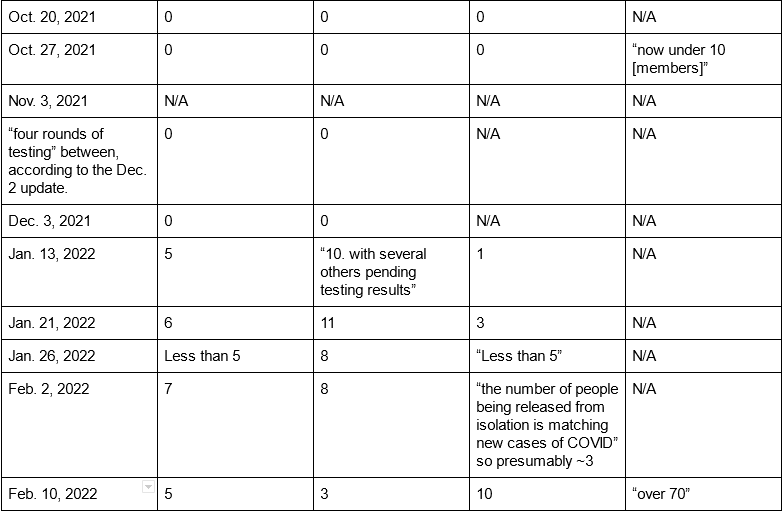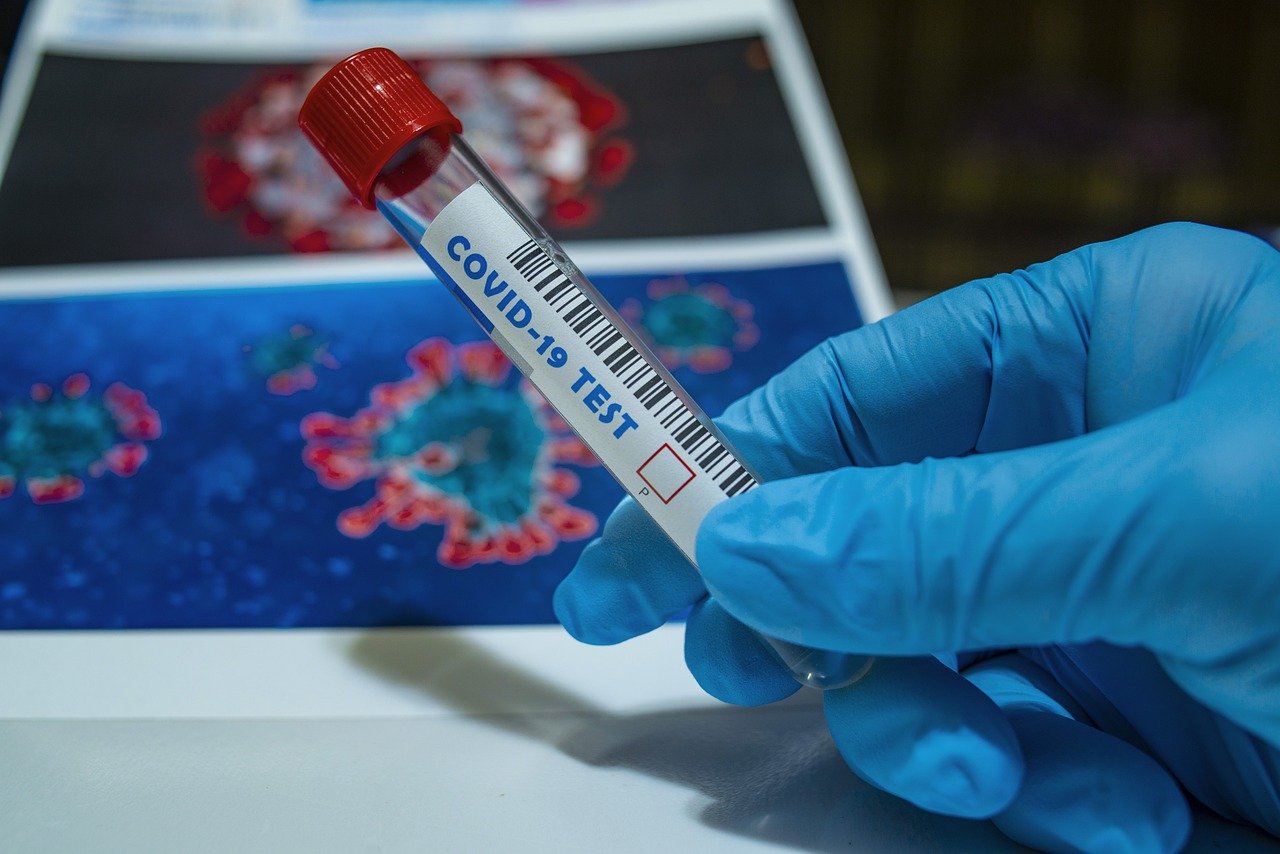A record 10 students are, as of Feb. 10, being either quarantined or isolated on campus. This is according to the COVID-19 updates written by Vice President for Finance & Administration Chris Kinsley. Also according to those updates, the previous high was, when a distinct number was given, three on Jan. 21, 2022. The first time that the number of students in quarantine or isolation on campus rose above zero since the beginning of the 2021-2022 academic year, if the number was given at all, was Jan. 13, 2022.
There are two places where students are either quarantined (if they are suspected to have COVID-19) or isolated (if it is confirmed they have COVID-19), mostly in Dort Residence Hall, some in Pei, according to Health Education Coordinator Susan Stahley. These students have food delivered to them from the Hamilton “Ham” Center and cannot leave. Those in Dort are not allowed to interact with other suite members, also isolated or quarantined.
Below is a table compiling the COVID-19 updates from Kinsley since the beginning of the year.


This data is not uniform and Kinsley phrased certain things differently at different times. However, it should provide some sort of insight into how New College has fared since the beginning of the academic year. The most important asterisk is that the Feb. 10 update says, “Currently over 70 NCF community members are being monitored for a high risk contact with someone who tested positive.” This is opposed to monitoring for “possible high-risk exposure,” the phrase used before (Sept. 15, Sept. 20, Sept. 29, Oct. 6), if any specification was given at all.
Information on isolation protocols are available in the updates from Kinsley.
“If you test positive for COVID-19 you are expected to isolate for five days,” the Feb. 2 update reads. “After the five days of isolation, you may return to work or classes if you are asymptomatic or your symptoms are resolving (without fever for 24 hours), but you must wear a mask for a period of 5 days whenever you are in the presence of someone else.”
Information on quarantining when one is experiencing symptoms is also available from the Feb. 2 update, but amounts to emailing Counseling and Wellness Center (CWC) Director Dr. Anne Fisher to discuss your individual situation:
“If you are a student with any COVID symptoms (including fever, chills, cough, shortness of breath, sore throat, fatigue, unusual congestion, runny nose, headache, muscle or body aches, nausea or vomiting, diarrhea, or loss of taste or smell), please do not attend in-person classes. Complete the COVID Screener on the NCF portal and contact Dr. Anne Fisher at fisher@ncf.edu.”
Information on quarantining when one does not show symptoms but has had a high-risk exposure is available as follows, in the Jan. 26 update:
“The College is asking anyone who has a high risk exposure to someone who has tested positive to contact Kristie Harris (kharris@ncf.edu) or Anne Fisher (fisher@ncf.edu) to discuss whether quarantine is appropriate as individuals who are vaccinated and boosted may not need to quarantine but others may need to do so.”
In general, guidelines are vague, and the college is handling each case individually, following no hard and fast rules, something Stahley echoed in an interview.
However, members of the Catalyst were informed on Feb. 7 that they had a high-risk exposure to a person who tested positive for COVID-19. The email provides insight into how the College is actually handling the situation, rather than how they say they will. The email that a Catalyst reporter received from Stahley began as follows:
“We wanted to let you know that at the end of last week you potentially had a high risk exposure to someone who recently tested positive for Covid. If you have been fully vaccinated and boosted, at this point there is nothing for you to do differently. You do not need to quarantine. However, it will be important for you to carefully monitor your health and mask indoors until at least Feb. 14. If you have any of the symptoms listed below, please stay home and let me know about it, so I can help you with next steps. It is recommended that you get tested within the next 5 days, just to be sure of your status. New College will once again be offering free walk up PCR tests on Tuesdays at Sudakoff, between 11 a.m. & 2 p.m. You can also request a box of Rapid Take home tests from the CWC by contacting myself or Dr. Fisher. PLEASE NOTE: If you tested positive for Covid in the last 90 days it is recommended you do not test via PCR as the test may still show positive, please test via a rapid test.”
The email goes on to state that students that are not fully vaccinated and boosted should obtain a COVID-19 on the upcoming Tuesday when on-campus testing is available:
“It is important for the health and safety of our community that we keep track of covid cases and notify potential high risk exposures. If you experience any symptoms or test positive we do need to know this information ASAP. Please reach out to one of us and complete the COVID Health Screener located on My NCF.”
The Catalyst has gone remote since this email.
The email reveals that those who are fully protected “do not need to quarantine” as long as they are not showing symptoms. Likewise, it reveals that those who are not fully protected, and not showing symptoms, will be handled on an individual basis until they can get a negative test result. Once they do, they are largely in the clear.
The college is no longer able to collect vaccination data, and as such relies on students who are not fully protected to respond to emails like this. Few do, according to Stahley, suggesting either that many students are fully protected or that many do not care enough to respond. These people go on the contact tracing spreadsheet kept by Stahley and others and continue to be monitored.
According to the Feb. 10 update from Kinsley, “the option to also have a rapid test on-site is also now available,” on Tuesdays in front of the Boars Head, in addition to PCR tests. Increasing numbers of students are taking advantage of on-campus testing, with 77 students getting tested on Feb. 8, according to Stahley.
A negative rapid test result is as good as a negative PCR test in that it allows non-fully-protected students without symptoms to avoid quarantining. This should help decrease the number of students who, despite not having any symptoms, have to quarantine as they wait for test results.
When the college was able to collect vaccination data, and published it in Kinsley’s updates, “the percentage of students reporting full vaccination vs. test only submission [was] 86%, based on 580 submissions.” That was Sept. 8, 2021. If these numbers have persisted and reflect the current fully-protected percentage, then few students have to worry about being quarantined due only to a high-risk exposure. However, according to the CDC, as of Feb. 15, of the country’s fully vaccinated population, only 42.9% have received a booster shot.
The college’s presumed 86% fully vaccinated status on Sept. 8 2021 far exceeded the 53% national average at the time. A consistent statistical proportion between NCF students and the national population would suggest that about 70% of fully vaccinated students are also boosted, meaning that hypothetically and in accordance to this proportion, 60% of students have received a booster. That would suggest that 40% of NCF students are not fully protected against COVID-19, and as such are reliant on a negative test result to avoid quarantining after a high-risk exposure.
Getting boosted is likely a good idea for many reasons, as well as avoiding the less than desirable reality of quarantine. Additionally, the New York Times describes the COVID-19 situation in Sarasota County, as of Feb. 15, 2022 as follows:
“Cases have decreased recently but are still extremely high… The test positivity rate in Sarasota County is very high, suggesting that cases are being significantly undercounted.”
This notion was iterated by Stahley in an interview. She suggested that transmission rates remain high due to the omicron variant, and that student’s should be masking heavily, particularly in the Hamilton “Ham” Center, even if they are fully protected.
For students that have not yet received a booster shot, free boosters are being provided on Feb. 16 inside HCL 7 and HCL 8 from 11 a.m. to 2 p.m. Students are advised to bring their vaccine card with them in order to speed up the process.

